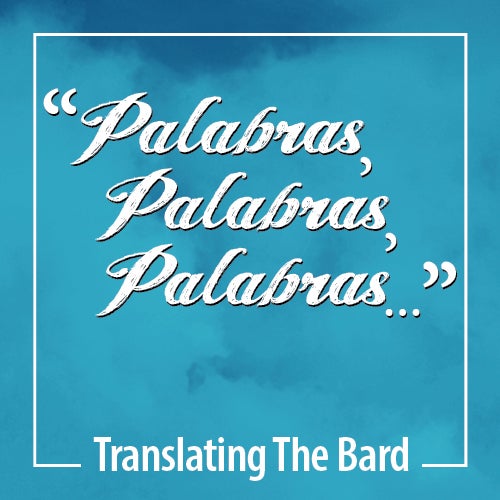Translating the Bard
What’s on this page? 
- Talking Terms
- Hear from the Artists: On Translation
- Translations and Colloquialism in Hamlet, Prince of Cuba
- Think About it Questions
Shakespeare in Spanish!?
 Directing and acting in a Shakesperean production is difficult enough when it is done in traditional Elizabethan English. So, why would Asolo Rep decide to take on the challenge of producing Hamlet in both traditional English AND Spanish? On this page, you can hear from the artist on WHY they made this choice and HOW they set about translating one of Shakespeare's most famous plays.
Directing and acting in a Shakesperean production is difficult enough when it is done in traditional Elizabethan English. So, why would Asolo Rep decide to take on the challenge of producing Hamlet in both traditional English AND Spanish? On this page, you can hear from the artist on WHY they made this choice and HOW they set about translating one of Shakespeare's most famous plays.
Want to explore more of the world and writing of William Shakespeare? Explore the activities on THE BARD page of our Midsummer Nights Dream Curriculum.

Talking Terms:
 Here are two terms that will be helpful to know as you explore this page:
Here are two terms that will be helpful to know as you explore this page:
Translation: The act of turning one language into another.
For example, translator Nilo Cruz worked with director and adaptor Michael Donald Edwards to translate the English version of Hamlet into our Spanish production Hamlet, Prince of Cuba.
Colloquialism: A word or phrase that comes from a specific local or regional. Usually an informal or everyday word or phrase.
For example, translator Nilo Cruz was very specific about including Cuban Colloquialisms in his translation.
Listen to Nilo discuss this process in the podcast below.
Check out a list of more English colloquialisms here.

Hear From the Artists: On Translation
 Have you ever wondered how a play is translated? Find out when you listen to these excerpts from conversations between Director and Adaptor Michael Donald Edwards and translator Nilo Cruz. After listening, discuss the Think About It questions below.
Have you ever wondered how a play is translated? Find out when you listen to these excerpts from conversations between Director and Adaptor Michael Donald Edwards and translator Nilo Cruz. After listening, discuss the Think About It questions below.
-
THINK ABOUT IT: Hear From the Artists
-
- What is something new you learned about playwriting or translation from Nilo's Interview?
- Why do you think it is important to include colloquialism when doing translation work?

Cuban Colloquialism
 Just like Shakespearean English and modern-day English are different, the Spanish language is also different depending on the time period and region where it’s spoken. To translate and adapt Hamlet, Prince of Cuba, playwright Nilo Cruz had to specifically look at Cuban Spanish and incorporate the colloquial terms of the island. Check out some of those Cuban colloquial terms you will hear in the production:
Just like Shakespearean English and modern-day English are different, the Spanish language is also different depending on the time period and region where it’s spoken. To translate and adapt Hamlet, Prince of Cuba, playwright Nilo Cruz had to specifically look at Cuban Spanish and incorporate the colloquial terms of the island. Check out some of those Cuban colloquial terms you will hear in the production:
|
Cuban Terms found in Hamlet Prince of Cuba |
In English |
In other Spanish |
|
Murmullo |
Murmur |
Susurro |
|
Santiguar |
Sanctify |
Persignar |
|
Barbaridades |
Atrocities |
Animalada |
|
Chiflado |
Madman |
Desquiziado |
|
Botonazos |
Hit |
Golpe |
Want to try it out? Us THIS WORKSHEET as your guide to Explore more Colloquial translation! Hoja de Trabajo en español.
-
Think About It: Translations and Colloquialism
-
- Why do you think we have differences in languages based on regionality?
- Have you ever experienced someone using a different colloquialism than you? How did you both react?
- Why do you think colloquialism and regionality are important factors for a playwright or translator to consider?
- If you speak Spanish, as you watch the production take note of any other Cuban-specific words that you are not familiar with.


